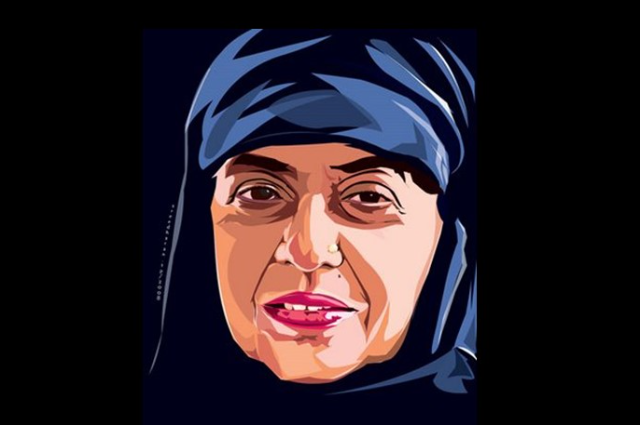Kamala Das (1934–2009), also known as Madhavi Kutty, began her career as a poet. The famed Indian author was bilingual, writing in both her native Malayalam and English. Kamala Das's works are rare in that they are unafraid to express themselves honestly and boldly. We feel as if she was born to write when we read her works. Her writing spilt forth, revealing her multiple avatars.
Living in a patriarchal environment, Kamala was brave enough to write in a confessional approach about delicate issues including women's lack of independence, female sexuality, love, and lust. Because of her enormous contribution to Indian literature, she was dubbed the "Mother of Modern Indian English Poetry."
Let us reflect on the life and accomplishments of this pioneer feminist Indian English writer on the occasion of her 88th birthday.
Early Years and Career:
Kamala Surayya was born in Malabar, Kerala, on March 31,1934. Balamani Amma, a noted poet, and V. M Nair, general director of the popular Malayalam daily Mathrubhumi, were her parents. She has had a passion for writing since she was a child. Kamala would scribble poems on her broken toys and anything else that piqued her fancy.
She was married off at the age of fifteen to Madhav Das, a bank employee. Kamala had to figure out how to balance her writing profession with her responsibilities as a wife and homemaker.
Kamala's poems exposed harsh reality and typically refer to a generation of women who were imprisoned in the four corners of their homes, oppressed by societal expectations. Love, passion, adolescence, menstruation, lesbian encounters, child marriage, and betrayal were all clearly illustrated in her books. This was unique in Kerala society, and many people were taken aback by her openness in her writings. Her father attempted to halt the publication of pieces in newspapers when she received a lot of criticism.
Kamala was invited to read her poetry at literary events in Germany, Jamaica, London, and Canada. She has worked as a writer for a national newspaper and in her home state of Kerala. Her compositions have been compared to Sylvia Plath and Marguerite Duras for their bold and direct presentation.
Many critics of Indian English poetry praised Kamala's first book of poems, Summer in Calcutta. She primarily wrote about love, betrayal, and the agony that follows.
Kamala wrote about how women were marginalised in a patriarchal society. She characterises her environment as "someone else's universe, not mine" in her poem A Widow's Lament. She expresses her dissatisfaction with being tied to gender norms she never desired in her poetry "An Introduction."
Kamala was not only a gifted poet, but she also tried her hand at writing columns for several publications when her family ran into financial difficulties. Her interests included everything from marriage and women to politics.
My Story: An Autobiography
Ente Katha (My Story), Kamala's autobiography, was published in Malayalam in 1973. In the most poetic way conceivable, it accurately expresses life, solitude, her intense longings, and her thirst for transcendence. She writes about her yearning for love and her personal and professional challenges as a woman in a patriarchal environment. The readers are introduced to the concept of female sexuality, which had previously been unknown to them. Ente Katha elicited a wide range of reactions, including astonishment and appreciation in equal measure.
People might be able to view "my homeless orphan, profoundly beautiful soul, deep beneath the bone..." once she stripped off her skin and crushed her bones, she replied in her trademark style.
In the genre of Indian autobiographies, it has become a cult favourite.
Her other literary works in English include:
- 1977: A Doll for the Child Prostitute
- 1992: Padmavati the Harlot and Other Stories
- 1964: The Sirens
- 1967: The Descendants
- 1973: The Old Playhouse and Other Poems
- 1977: The Stranger Time
- 1985: The Anamalai Poems
- 1997: Only the Soul Knows How to Sing
Kamala's literary works have garnered her a slew of awards and accolades. In 1963, she received the P.E.N.'s Asian Poetry Prize, the Kerala Sahitya Academy Award in 1969 for the short story Thanuppu (Cold), and the National Sahitya Academy Award in 1985 for the short story Thanuppu (Cold). She was also nominated for the Nobel Prize in Literature in 1984. Her works were so well-received that they were translated into a variety of languages, including German and French.
Kamala Das was a feminist in many ways, even though she never openly identified as one. She never let anyone, including her family, stop her from pursuing her goals. She believed in herself and put in a lot of effort to pursue her dreams. She carved herself space for herself in a male-dominated field of literature and boldly protected it.
She not only defied gender standards in society, but she also spoke vehemently against them, giving thousands of other women a voice in a patriarchal world. As a result, Kamala Das qualifies as a feminist in every meaning of the word.
Controversies:
Kamala Das' life was full of controversies, and she was frequently chastised. Her nude pictures generated a stir when she first started painting professionally. Following her marriage to her beloved, she converted to Islam and took the name Kamala Surayya.
Kamala Surayya died on May 31, 2009, at the age of 75. The biopic Aami pays tribute to her life (2018).
Kamala Surayya will always be a beloved writer among the people of Kerala, as well as followers of Indian English literature, despite being a contentious writer.

